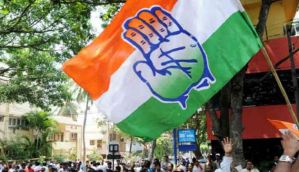Speed News Desk
| Updated on: 13 February 2017, 11:12 IST

TWEET THIS
President Pranab Mukherjee, on 1 December, addressed the students and teachers of Gujarat Vidyapith on the occasion of sixty-second convocation of the varsity. The President's speech was appreciated by the students and teachers alike.
Here is the full text of the speech:
- It is my privilege to be here today for the sixty-second convocation of Gujarat Vidyapith. This historic institution was founded in 1920 by Mahatma Gandhi, who was its Chancellor since inception and remained so till he breathed last. Dr Rajendra Prasad became the Chancellor of Gujarat Vidyapith after Gandhiji and Sardar Vallabhbhai Patel. After him, the legacy was inherited by Morarji Desai, who served the longest term as Chancellor for 33 years. The previous Chancellor Nararyan Desai was the son of Mahadev Desai, who spent his childhood and early youth with Gandhiji.
- Let me congratulate the graduating students or snataks as Gandhiji would have liked to call them. I am aware that some of my predecessors have graced this occasion in the past. I consider it a special responsibility being amongst you all and addressing the graduating students of this unique seat of learning. More so as, before coming here, I had the occasion to spend some time at the Sabarmati Ashram that Bapu had set up in 1917. Even now, the environment of the Ashram reverberates with the spirit ofSatyagrahaand constructive programme of yesteryears.
Dear students:
- Gandhiji was a great soul who showed the world that Satyagraha or the Force of Truth and Ahimsa or Non-Violence can be marshalled to create a more just world. Gandhi was a rare visionary. He created this university, which is going to complete one hundred years soon, because he realized that education and education of youth was a sound way to form the new world. It is heartening to find Gandhiji's ideals well-entrenched in this institution as it marches ahead in imparting higher education. It today offers 12 courses at the graduation level, 9 at post-graduation, and 20 at MPhil stage, besides diploma and certificate courses.
- Gujarat Vidyapith has made good progress in imparting education in contemporary subjects like microbiology, computer science and energy technologies. At a time when higher education is becoming increasingly costly, this Vidyapith has become an institution of choice for youth from the underprivileged sections, with 80 percent of the students' enrolled belonging to these backgrounds. That 40 percent of the student population comprises girls is an encouraging sign. The state and the society at large ought to continue supporting such a noble organization.
Friends:
- For social reconstruction, Gandhiji had propounded the principle of Nai Talim which states that knowledge and work are not separate. The constituents of Nai Talim are the 3-H: heart, hand and head. To put this philosophy into practice, Gandhiji promoted an academic curriculum of 'basic education for all'. With ashram shalas and buniyadi schools operating in the remote areas, Gujarat is perhaps the only state where Nai Talim exists in an institutional form. Gandhiji had said and I quote: "Literary education is of no value, if it is not able to build up a sound character" (unquote). Nai Talim infers charitra nirman or character building, whose relevance is increasing by the day. Without doubt, learning with value-orientation must guide our approach in education.
- Gujarat Vidyapith provides education aimed at building the character, competence, culture and conscientiousness in students. This is needed to regenerate the country according to Gandhian ideals. This institution has been specially mandated to educate youth for Gram Swaraj, which is a laudable goal espoused by Gandhiji. He firmly held that India lived in her villages. Despite growing urbanisation, 68 per cent of the country's population still resides in rural areas. Intervention in food security, education, skill development, employment, technology dissemination, health and nutrition, housing, drinking water, and sanitation would go a long way to uplift the quality of rural life and address poverty concerns. I am told students of this institute are oriented and trained to support rural development in line with Gandhiji's vision. Initiatives such as this would help create self-reliant villages and achieve equity as well as economic and environmental sustainability. This, according to me, will lead to a Samarth Bharat.
- As a country, we have promised ourselves a Swachh Bharat by 2nd October, 2019 to commemorate the 150th birth anniversary of Gandhiji. It is noteworthy that students of this institute through their own labour have kept the campus clean. Such traditions in community life are not built in a day. Hence, it must be the endeavour of each one of you to proliferate this noble practice outside. Swachh Bharat, according to Bapu, implied a clean mind, clean body and clean environment. Every citizen has a duty to rededicate themselves to create a clean external and internal environment of self and society to make Swachh Bharat possible. I am certain you will make ideal citizens who will endeavour to keep our country Swachh and make it Samarth.
Friends:
- Gandhiji in life and in death struggled for communal harmony. Educating in peace and harmony is the key to contain and reorient the disruptive forces in society. The motto of Gujarat Vidyapith is "Sa Vidya Ya Vimuktaye", that is "Education that Liberates".The students of Gujarat Vidyapith are not only learning Gandhian thought as a subject, but they are being provided exposure to world religions as well. This institute should continue to demonstrate that it is by educating the heart and mind of the youth that social rejuvenation on the path of non-violence is possible. In this context, I compliment Gujarat Vidyapith for having brought out a digital version of the Collected Works of Mahatma Gandhi in collaboration with the Ministry of Information and Broadcasting. This will enable wider dissemination of Gandhian thought and philosophy amongst people.
Ladies and Gentlemen:
- The higher education sector in India faces numerous challenges today. On the one hand, there is need for increasing access and making education affordable. On the other, there is need to ensure quality and pursue excellence. These are not contradictory objectives but complementary goals. Quality consciousness must be at the back of every initiative in our higher academic institutions. Many meritorious students leave the shores of our country and study abroad due to lack of institutes in India conforming to high standards of education. Not many international students come to India for higher studies either. It is a worrying sign that the number of students from seven out of the top eight countries in this respect - US, Germany, France, South Korea, Australia, China and Singapore - have dipped 73 percent in 2014. We must do all at our end to reverse this trend and make India emerge as a quality and affordable education destination for students outside.
- The developmental challenges faced by our country call for an inspired response from the higher education system. Quality and relevant research can help tide over our socio-economic problems. To build a research eco-system, we need to adopt a multi-disciplinary approach, promote research at under-graduate level and develop scientific temper in the students. Due thrust on innovation is required to transform novel ideas into 'viable-cum-enviable products'. Despite focused attention on innovation in recent years, India lags behind many countries on this front. At 81st position in the Global Innovation Index 2015, we have much ground to cover. An efficient set-up for mentoring innovative ideas and nurturing grassroots innovations could see our country surge ahead in innovation.
Ladies and Gentlemen:
- India is home to a large population of the young. Demographic dividend can occur only if greater number of competent and skilled professionals is produced by our higher educational and technical institutions. This calls for skill development initiatives on a massive scale. For that, cooperation amongst our institutes is necessary. Technology must be leveraged to bring greater number of youth in the skill net. Massive Open Online Courses (MOOCs) has become a preferred mode of learning due to its merits of scale, speed and cost. Interactive MOOCs can offer vocational aspirants equal opportunity to learn. Such an initiative can revolutionize delivery of skills knowledge and revamp vocational education in the country. Skilling efforts would also call for fusion of traditional technology with cutting-edge technology. I am told that Gujarat Vidyapith educates students in charkha and computer with equal enthusiasm. The students here are imbibed with the spirit of 'dignity of labour'. I am sure they will put their training to good use and become worthy citizens of our nation.
Dear students:
- As you leave the portals of your alma mater, remember to use your education effectively. Apply the Gandhian principles at every stage of your life. With the distinct training of Heart, Hand and Head which is Nai Talim, the onus is on you to construct a Samarth Bharat. I wish everyone gathered here the very best for the future.
Thank you.
Jai Hind.







![BJP's Kapil Mishra recreates Shankar Mahadevan’s ‘Breathless’ song to highlight Delhi pollution [WATCH] BJP's Kapil Mishra recreates Shankar Mahadevan’s ‘Breathless’ song to highlight Delhi pollution [WATCH]](https://images.catchnews.com/upload/2022/11/03/kapil-mishra_240884_300x172.png)

![Anupam Kher shares pictures of his toned body on 67th birthday [MUST SEE] Anupam Kher shares pictures of his toned body on 67th birthday [MUST SEE]](https://images.catchnews.com/upload/2022/03/07/Anupam_kher_231145_300x172.jpg)






